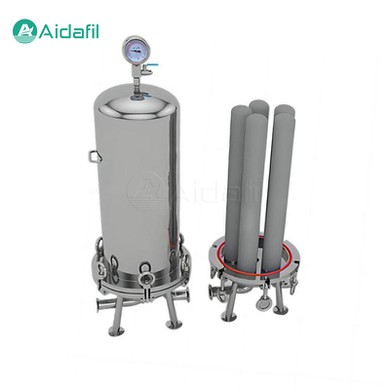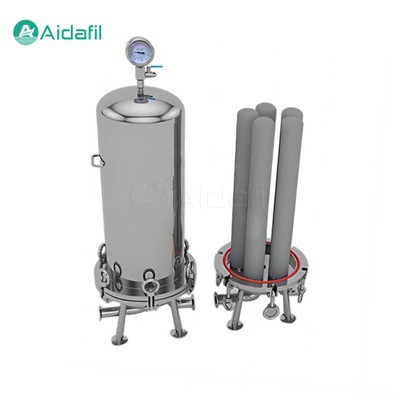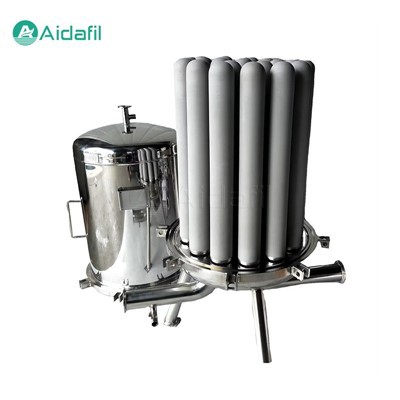
Stainless Steel Titanium Rod Filters
The stainless steel titanium rod filters are mainly composed of the stainless steel shell and the titanium powder sintered filter elements. The shell is usually made of high-quality stainless steel materials such as SUS304 or SUS316L, which have excellent corrosion resistance and mechanical strength. The titanium powder sintered filter element gives the filter many excellent properties.

The stainless steel titanium rod filters, as the name suggests, are mainly composed of the stainless steel shell and the titanium powder sintered filter elements. The shell is usually made of high-quality stainless steel materials such as SUS304 or SUS316L, which have excellent corrosion resistance and mechanical strength. The titanium powder sintered filter element gives the filter many excellent properties.
The unique charm of titanium powder sintered filter element
1. High-precision filtration. Like a fine sieve, it can accurately intercept tiny particles and impurities to ensure that the filtered fluid is incomparably pure.
2. High-temperature and high-pressure resistance. Even under extreme temperature and pressure conditions, it can still work stably and demonstrate tough quality.
3. Strong corrosion resistance. It can resist the erosion of various corrosive media and remains rock-solid in harsh environments.
4. High mechanical strength. It has good compression and impact resistance, and is not easily damaged after long-term use.
5. Reproducible use. This feature not only saves costs, but also reduces resource waste, reflecting the concept of sustainable development.
Excellent quality of stainless steel shell
1. Sturdy and durable. The excellent materials of SUS304 and SUS316L stainless steel enable the shell to withstand various external forces and environmental tests.
2. Beautiful and elegant. The simple and smooth design adds a clean and beautiful appearance to the industrial site.
3. Highly adaptable. It can adapt to different working environments and process requirements, and has a wide range of application scenarios.
The advantages of standard quick-loading connections
1. Compact structure. makes the overall layout of the filter more reasonable and takes up less space.
2. Beautiful appearance. not only practical, but also decorative.
3. Easy to disassemble and clean. Greatly improve the efficiency of maintenance and maintenance, saving time and labor costs.
Working principle
When the fluid passes through the filter, the titanium powder sintered filter element will intercept the impurities and particles in it, allowing only pure fluid to pass through. As the filtration progresses, impurities will gradually accumulate on the filter element. When it reaches a certain level, the performance of the filter can be restored by cleaning or replacing the filter element.
Application domain
1. Chemical industry. Be used to filter various chemical raw materials and products to ensure the purity and safety of the production process.
2. Pharmaceutical industry. Play an important role in the production of medicines, ensuring the quality and efficacy of medicines.
3. Food and beverage industry. Filter out impurities to provide consumers with healthy and safe food and beverages.
4. Electronics industry. Ensure the cleanliness of the production environment has an important impact on the quality of electronic products.
5. Environmental protection industry. Help treat wastewater and waste gas, contributing to environmental protection.
Parameters
|
Main materials |
Stainless Steel 304, 316L |
|
Filtering flow |
3 - 100 t/h |
|
Working pressure |
0.1 - 0.6Mpa |
|
Filter element specification |
5'', 10'', 20'', 30'', 40'' |
|
Use temperature |
-10 - 200°C |
|
Filtering accuracy |
0.45 - 100μm |
|
Filter element connection |
M20, M30, 222, 226 |
|
Titanium rod size |
Φ60×300, Φ60×510, Φ60×750, Φ60×1000 |
Care and maintenance
1. Regularly check the working status of the filter, including the clogging of the filter element and the integrity of the housing.
2. Clean the filter element according to the specified time and method to extend its service life.
3. Be careful to protect the filter from external damage, such as collisions, drops, etc.
4. Conduct regular inspections and maintenance of the connection to ensure that the connection is firm and well sealed.
FAQ
1. Q: What is the function of a filter?
A: The main function of a filter is to remove solid particles, impurities, and harmful substances from liquids or gases, in order to achieve purification, clarification, and protection of equipment.
2. Q: How to choose a suitable filter?
A: When choosing a filter, factors such as the properties of the material being filtered (e.g., viscosity, temperature, corrosion), required filtration accuracy, processing capacity, operating pressure and medium, as well as the type, material, size, and installation method of the filter should be considered.
3. Q: What is the working principle of a filter?
A: The working principle of a filter mainly relies on physical screening, deep interception, absorption, or chemical reactions to remove impurities or harmful components from the material being filtered.
4. Q: How to maintain and care for a filter?
A: Maintenance of filters includes regular cleaning or replacement of filter elements, inspection of seals and fasteners, maintaining stable operating pressure, and avoiding overloading. Specific methods should be referenced from the filter's instruction manual and maintenance guides.
5. Q: What is the service life of a filter?
A: The service life of a filter depends on its working environment, processing volume, and filtration accuracy. Generally, when the filter's pressure drop reaches a certain value or the filtration effect decreases significantly, it needs to be replaced or cleaned.
6. Q: What should be paid attention to during filter installation?
A: During filter installation, attention should be paid to the directionality, ensuring that the fluid enters and exits from the correct ports. Also, the piping system should be cleaned before installation, and the filter should be securely fastened and sealed as required by the instructions.
7. Q: What is the replacement cycle for filters?
A: The replacement cycle for filters depends on their working conditions and filtration requirements, and is usually indicated by pressure difference indicators or timers. When the filter's pressure drop reaches the set value or the filtration effect decreases, it should be replaced in a timely manner.
Why Choose Us
· Professional manufacturer with many years' experience
· Good quality with competitive price
· OEM & ODM are welcome
· Various payment items are acceptable
· Good service by experienced manager
AIDA Philosophy
1. Management Concept:
· Satisfy the customers' demand --- Touch customers, trust with our products and services
· Make employees happy --- Pursue higher material and spiritual happiness
2. Company Mission:
· Focus on customer needs, provide best filtering solution
· To be the lifelong partner with customers
3. Corporate Vision:
· Become a global purification leadership brand
4. Values:
· Customer: Pursue the ultimate experience, enjoy excellent quality
· Team: Trust, responsibility, growth, win-win
· Work: Simple, sincere, efficient, dedicated
Hot Tags: stainless steel titanium rod filters, China, factory, price, buy, Compressor Oil Separator, lube oil filter elements for steel plant, return oil filter metal mesh, coalescing filter element against water, pressure proof compressed air filter element, Machine Oil Filter







